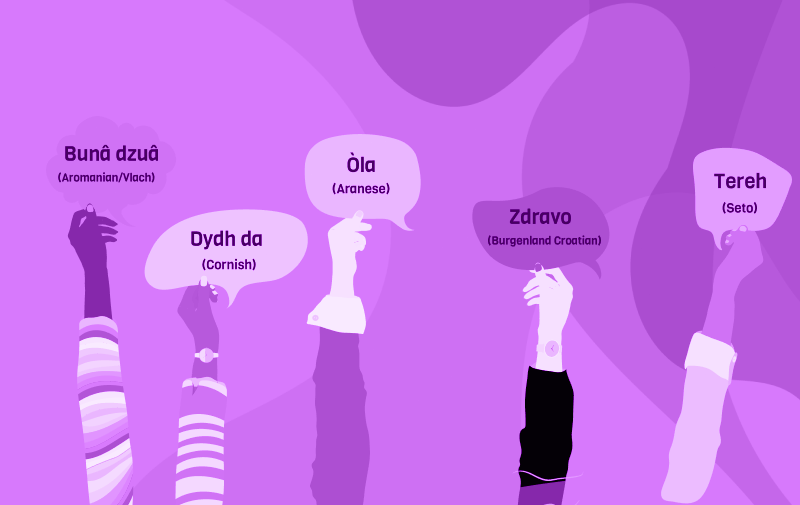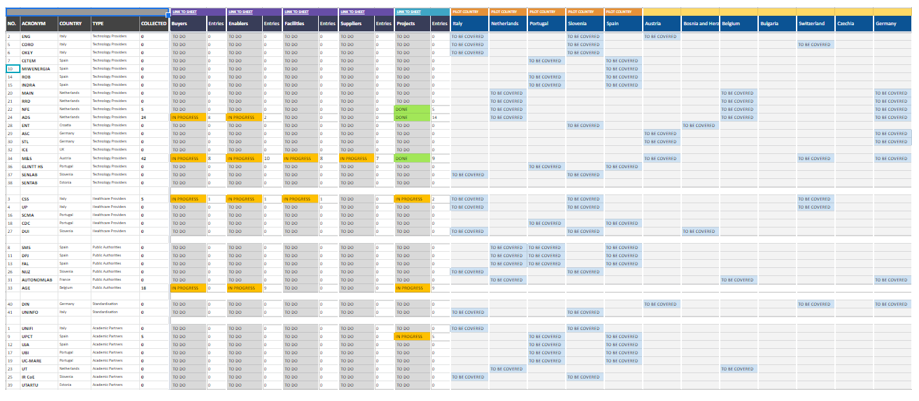
01 Aug RISE UP: Five minoritised language communities as the project’s case studies
The RISE UP Project focuses its work on five minoritised language communities: Aranese, Aromanian, Burgenland Croatian, Cornish, and Seto. The five communities as the project’s case studies represent a range of different political and socio-economic preconditions that language minorities can face. RISE UP aims to work with the five communities to develop strategies and tools to interconnect members of minoritised language communities, strengthen their languages and cherish cultural heritage.
While RISE UP aims to deliver results and tools that will be of benefit and applicable to all endangered languages, the project will especially focus on five selected language communities across Europe: Aranese, Aromanian, Burgenland Croatian, Cornish, and Seto.
Aranese
Aranese (Aranés) belongs to the Romance language family, specifically the Occitan group of western Romance languages. It evolved in Val d’Aran, a valley in the Pyrenees in Catalonia, Spain. The language has official status, along Catalan and Spanish. Aranese has roughly 3000 – 6000 speakers, and many of the locals speak up to five language varieties: Aranese, Catalan, Spanish, French, and English, and switch between them as needed. This linguistic eco-system is further enriched by migrants from mainly Central and South America.
Aromanian
Aromanian ( Armãneashti/Armãneasche/Rrãmãnesht) is a neo-Latin language belonging to the Romance family, specifically the Eastern/Balkan Romance group. The language is spoken in Albania, Bulgaria, Greece, North Macedonia, Romania, and Serbia. Since Aromanians live in several countries, their life and their language’s circumstances are strongly shaped by the policies issued in each of them. Aromanian is mainly spoken at home and in the community and is increasingly used online. Several writing standards have been proposed. Today a standard is emerging from within the online community, however, orthographic conventions remain divisive.
Burgenland Croatian
Burgenland Croatian (Gradišćansko-hrvatski or Burgenländischkroatisch) belongs to the Slavic language family, specifically to Croatian. It evolved in Austria, mainly in the province of Burgenland, and smaller communities exist in Hungary, Slovakia, and the Czech Republic. This variety is spoken across state borders in multilingual and multi-cultural settings. 47 villages in Burgenland count as Croatian-German bilingual. In 2001, 19 400 speakers declared Burgenland Croatian as their vernacular, and there are reports of 30 000 – 65 000 speakers overall. A standardised variety was developed in parallel and independently from Standard Croatian, and Austria recognised Croatians in Burgenland as an ‘autochthonous’ regional minority a long time before the European Charter for Regional or Minority Languages (ECRML) (States Treaty 1955).
Cornish
Cornish (Kernewek or Kernowek) belongs to the Celtic family of languages and evolved in Cornwall, England. Cornish is the only RISE UP language variety that is a reclaimed language, and there are smaller Cornish-speaking communities in London, Cardiff, and around the world. Revival movements for Cornish started taking place again in the early 20th century, and a census in 2021 found that 563 people now identify as speakers of Cornish, while other sources suggest that more than 3,000 people have at least some conversational Cornish skills. In 2010, UNESCO officially reclassified Cornish from “extinct” to “critically endangered” – as Cornish scholar Robert Morton Nance remarked before his death: “One generation has set Cornish on its feet. It is now for another to make it walk.”
Seto
Seto (Seto kiil’) belongs to the Finno-Ugric language family and evolved in the Seto region, Setomaa (literally “The Land of the Seto”), which is often said to lie ‘katõ ilma veere pääl’ – “on the border of two worlds” between Estonia and Russia There are now reports of approx. 250 Seto left in Russia, 4000 in Setomaa, and 25 000 –
30 000 speakers with some Seto knowledge in all of Estonia, Siberia (due to a migration wave a hundred years ago), and the rest of the world. However, the language is not officially acknowledged as a minority language in Estonia, despite lobbying efforts by the Seto community for more than a decade. The Seto are actively building relationships with other Finno-Ugric speaking communities in Russia and Scandinavia, while the Seto Council declared the indigeneity of Seto in 2017.
To learn more about these five language communities and their needs in the context of RISE UP, the project is conducting surveys, available in 17 languages, as well as carrying out fieldwork and working in direct collaboration with members of the communities.
Links
RISE UP Project website: www.riseupproject.eu
Subpage on the selected language communities: https://www.riseupproject.eu/selected-language-communities/
Keywords
Minoritised language communities, minority, endangered languages, language revitalisation, case studies

